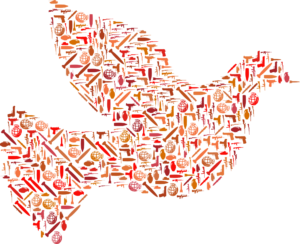You’ve Got to Be Taught to Hate and Fear
If people can learn to hate, they can be taught to love,
for love comes more naturally
to the human heart than its opposite.
Nelson Mandela
Recently, Larry and I were discussing our concerns about the increasing expressions of hatred and fear of others in our country. We realize that this has been an ongoing part of our history, often unacknowledged, as people found ways to reject or even to demonize others out of fear and hatred.
As we talked, I remembered a song that provides one way of looking at this issue. In the 1958 movie, South Pacific, a young American Lieutenant sings about the prejudice against the native people who inhabit the islands where they are stationed during World War II.
This song provides an opportunity to consider why hate and fear have become so prevalent in our country today.
You've got to be taught, to hate and fear
You've got to be taught from year to year
It's got to be drummed in your dear little ear
You've got to be carefully taught
You've got to be taught, to be afraid
Of people whose eyes are oddly made
And people whose skin is a different shade
You've got to be careful taught
You've got to be taught before it's too late
Before you are six or seven or eight
To hate all the people your relatives hate
You've got to be carefully taught
You've got to be carefully taught
I agree with the premise of this song that we have to be taught to hate, because we are not born with hatred in us. Babies naturally want to connect with others, not push them away.
After listening to the song again, I thought about my life.
When I was 13, I was part of a group that met in our church to talk about life issues. One evening, the subject was hatred of Jews. That subject had never been discussed in my family, so I was surprised to learn that it was a problem.
At that time, my mother was working as secretary to the director of the Cottage School in Pleasantville, New York, a program of the Jewish Child Care Association. It was a residential school for children from New York city who were orphaned or had been removed from their families for their safety. The staff were very dedicated to caring for and nurturing children in need, and they welcomed our family into their community.
I was pleased when we were invited to participate in a seder, the ritual meal on the first night of Passover. As I began to learn more about Judaism and ancient history, that triggered my life-long interest in world religions.
I developed an appreciation for the Jewish people. Those that I knew were extraordinarily kind, generous people, doing good in the world. I could not understand why other people were taught to hate them.
Years later, when my daughter was a toddler, she and I were part of a play group, with two girls, two boys and four moms. We met weekly for a few years. My husband, John, and I became long-term friends with Nina and Jerry, the parents of the other girl in the group. One year, they invited us to join them for a seder, and my children were introduced early to the idea that people have different traditions, and that they make our friendships more interesting.
My son, David, had a good friend in middle school whose family was from Iran. The boys were skateboard buddies and David sometimes spent an afternoon with their family. The parents were kind and generous people. Religion never came up because it was irrelevant to the boys’ friendship.
I have since known other Muslims. I see them as kind people who are good citizens, adding value to our society. So, I was appalled when politicians in our country began to demonize Muslims as enemies.
Having studied Islam, I am aware that it is a religion that teaches peace. Jesus is one of the prophets written about in the Koran, the Islamic holy book. He is not worshiped, but he is revered, and his message of love and peace is part of the Islamic tradition.
When my daughter, Christie, was a teenager, one of her friends, our next door neighbor, was Jewish. One day, the girls were gathering friends to go to the local synagogue to protect people. They had heard that some local teenagers were planning to harass people after their service. David and I also joined them. Well, no harassers showed up, but the event showed me that we still had some unresolved issues in our country.
Looking at our country today, I see that blatant hatred is much more acceptable than it was 30 years ago. I see politicians promoting fear and hatred of others for the misguided purpose of gaining followers:
-
Treating all Muslims as enemies,
-
Seeing refugees seeking refuge from countries, where their lives are at risk, as a threat to our country,
-
and recently, the resurgence of antisemitism, treating citizens who are compassionate, contributing members of our society as though they had no right to be here.
As a result, we have seen an increase in violence against innocent people and laws that support the ongoing demonization of targeted groups.
How did we get here?
People were taught to hate and to fear selected others. It is an ancient trick to gain political power, and it is dangerous to any society.
So, where do we go from here? Certainly not adding our own hate or fear into the mix.
Turning Walls into Bridges
Many people share our desire for a world of inclusion in which we honor each other and live together with appreciation for what each person has to offer.
Joining an interfaith group can be very empowering. As we get to know more about people of other faiths, we discover that we share many values and beliefs, even while our history and our rituals may be different. These groups can have a large impact on a community as participants go back to their place of worship and share what they are learning. Often, entire congregations then come together for shared worship or for service projects in their community. They might also provide a protective shield for those who may be targeted otherwise.
Another way to bring love to places experiencing hatred is to volunteer with programs that support people who have been shut out or targeted by hate. As an example, some programs help refugees find homes, clothing and other supplies that they need for their new life. Equally important, volunteers welcome the newcomers and create a safety net to help them transition into their new community.
Kindness Is an Antidote to Hate and Fear
We need to remember that every act of kindness does make a difference. We cannot change anyone else, but we can bring love and kindness into any situation, whether it is well received or not.
This isn’t always easy. Some encounters are challenging, especially when hatred is involved. We can easily be pulled back into habitual behaviors that add more heat to the fire. But with practice, we can become comfortable responding with kindness. It may not change anyone else’s behavior, but it might cool down the immediate situation and, perhaps, inspire others to do the same.
When we act with kindness, we do not always see an immediate change. As nice as that would be, it is not our primary concern.
This brings us back to who we choose to be in the world.
When we choose to live with love, we are making a difference, whether we can see it now or not. We never know who has been uplifted or encouraged by our acts of kindness. We don’t need to know.
Our first commitment is to ourselves, to bring love into the world whenever we can. We don’t have to be perfect at it. We just need to keep showing up and giving it our best shot.
As more and more of us choose to do that, together, we will provide an antidote to hate and fear. And our lives will be enriched in the process.
We wish you love and joy on your journey.
Image by Gordon Johnson from Pixabay
Click here to see and hear the song, "You've Got To Be Carefully Taught."
What are your thoughts? Please leave a comment below.
Help us spread the message of kindness. If you know others who might appreciate these ideas, please share below.


That was a different, and in many ways better, time back then. I remember that Seder dinner, and George Hillelson(?), our mother’s boss. And we also had Dr. Sheffield, our Jewish church organist, who’s daughter, Rosalie, was a classmate of mine. I had several dinners at their house. It was a great way to learn about the religion within which Jesus was raised.
Thank you, Bob, for adding to my memories.
Yes, Dr. Sheffield was a great choir director.
I used to “babysit” for Rosalie when she was younger.
She was hoping to be a ballerina,
Nice family.